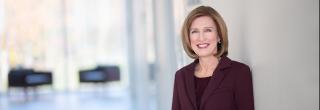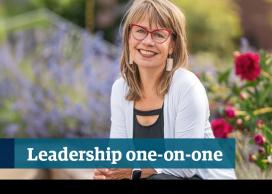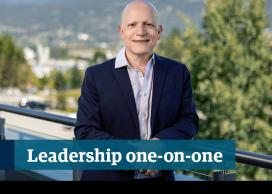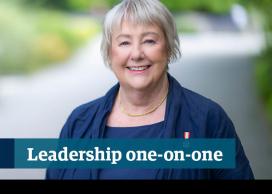Heather McCaw is UBC’s Vice-President, Development and Alumni Engagement (DAE). She rejoined her alma mater in 2018, having served previously as the Vice-President of Advancement at the University of Alberta. As Vice-President, DAE, Heather leads the development and alumni engagement activities across the university’s two campuses. Over the course of her career, she has been involved in several major campaigns and co-directed UBC’s historic start an evolution fundraising and alumni engagement campaign which raised over $1.6 billion from 2008 through 2015 and actively engaged more than 130,000 alumni in the life of the university.
In addition to 25 years of experience in the post-secondary sector, Heather was vice-president of two associated consulting companies, Give Canada Fundraising Corporation and Spectrum Marketing Corporation. These organizations specialize in securing strategic business partnerships and multimillion-dollar donations on behalf of non-profit clients that have included the United Way of the Lower Mainland, the Rick Hansen Foundation, the universities of Calgary and Victoria, and the Toronto Rehab Foundation.
Q1. What quality do you most admire in a leader?
HM: The quality I admire the most is inclusiveness. For me, that began early in my career. I started my fundraising journey at UBC more than 20 years ago, as one of the first development coordinators. I recall at that time, seeing certain leaders treat people differently depending on their role. It can be easy to only recognize those on the frontline of fundraising, but it takes a whole team, many of whom are behind the scenes. Having done both frontline and support roles, it became important to me to make sure everyone feels valued and appreciated for their contributions, regardless of role. As my career progressed, I developed a deeper understanding of inclusiveness and what it means to ensure a culture that is welcoming and respectful of individual differences where everyone has equal opportunities to learn and grow in their career. That matters a lot to me.
Q2. What makes you laugh?
HM: I laugh at life. I feel grateful to have colleagues and friends with a good sense of humour. I also laugh at myself, especially when I put my foot in it. My family takes great delight at hearing those types of stories at the end of the day. But if there’s one thing guaranteed to make me laugh it’s the unfiltered things that toddlers say. They are so genuine!
Q3. Who inspires you, and why?
HM: I am inspired by the courage of those who are willing to forge ahead, to carve a road for others to follow despite great adversity and personal risk. People like Nelson Mandela, Mahatma Ghandi, Malala Yousafzai and so many others throughout history who were able to accomplish such extraordinary things through incredible fortitude, conviction, and bravery.
Q4. For you, what makes UBC different?
HM: I have to acknowledge the beauty of our campuses, which makes UBC such a special place. But the thing that really makes it different is the people. I feel that UBC is at an exciting point, where momentum is building and many people across the institution are taking personal ownership of common goals. An example is UBC’s commitment to sustainability, where we are operationalizing our commitments as well as helping address them within broader society. The Indigenous Strategic Plan and the Inclusion Action Plan are also examples of the university putting resources and focus into these areas so we can see real change.
Q5. What is the most important lesson you’ve learned, in your career to date?
HM: Most important to me (and I am grateful to have learned it early on) is that relationships are key to success, especially within a university environment. We rely on other people around us to help make our best work happen. Relationships are also at the core of fundraising and alumni engagement. We need to be able to have conversations based on trust and this means authentic relationship building.
Q6. How do you like to recharge?
HM: I like to watch a good movie, read a good book or go on a bike ride. But nothing recharges me more than sitting quietly with a sleeping, newborn baby in my arms. The sense of peace is magical – I wish I could bottle it! I am also a new grandma so I am loving those opportunities to cuddle my grandson and then hand him back when he wakes.
Q7. What is the best advice you were ever given?
HM: When I was finishing my business degree, I wasn’t sure where my career would take me and would probably have gone down the road of HR/labour relations. I was chatting with one of my professors one day and he said I should consider a career in fundraising. Looking back, I can’t imagine doing anything else and I feel incredibly lucky for the experiences it has given me. In fundraising, you get to meet some wonderfully generous, accomplished people who want to give back through philanthropy, and you get to work with so many amazing charities and institutions. It is both humbling and inspiring at the same time.
Q8. What do you value in your colleagues?
HM: Reliability, trust, and forthrightness. I always want people to be honest, and tell me what they are thinking. I also value having a close circle of colleagues who I can trust and talk through problems with. I believe any leader needs to have trusted colleagues that they can open up to, test ideas with and get advice from.
Q9. What do you hope will be your lasting impact at UBC?
HM: I hope to make DAE an even more integral part of the university enterprise by launching the most ambitious fundraising and alumni campaign in the university’s history. We are still finalizing the goals but we know they will be bold. For example, not only are we planning to increase our annual fundraising by 50%, we will also be involving twice as many alumni in the life of the university and pursuing innovative ways of opening new possibilities for UBC. We feel this is the time to be ambitious and I am excited to see our campaign unfold.
Q10. If you could have a super power, what would it be?
HM: The ability to fly. There are so many places I would love to travel to, and air travel (as we currently know it) is a big contributor to the climate crisis. So, the ability to fly would be wonderful.
Q11. This year UBC is embarking on a new significant fundraising and alumni engagement campaign, why does this matter?
HM: Fundraising can help UBC generate the resources to do things it wouldn’t otherwise be able to do. With regard to our new campaign, we have spent time talking with academic leaders about their fundraising priorities and how they are tackling some of society’s biggest challenges. We now have a collective campaign focus on advancing healthy lives, a healthy planet and healthy societies.
And across all these areas, we have an opportunity to demonstrate our commitment to innovation, inclusion and Indigenous reconciliation. The intention is to generate funds to support students, create new faculty positions and fund new and existing research. What also makes this campaign different is that we are using it as a platform to not only raise an ambitious amount of funding but also demonstrate UBC’s leadership in helping tackle these complex societal issues. UBC consistently ranks in the top 20 public universities in the world – we are ready for this.
Q12. What role do alumni play in the university and its vision for the future?
HM: Many find it is easy to relate to the fundraising side of our work, but we really couldn’t do what we do without our alumni community. They play such an important role as partners to the university, and champions of UBC. Many of them volunteer their time to support UBC, they act as student mentors, come into our classrooms and even volunteer to read admission applications. They are a part of UBC and UBC is a part of them. The vision of alumni UBC is ‘A global alumni community for an exceptional UBC and a better world’ which is so closely aligned to UBC’s vision of ‘Inspiring people, ideas and actions for a better world’. UBC is incredibly fortunate to have an engaged alumni community, many of whom can be found within our faculty and staff. We are excited to see that grow even more in our forthcoming campaign.
Published: January 10, 2022
Interviewed by: Kate Hunter, UBC Internal Communications



